- Clone
- UCHT1; 3G8; MEM-188;
- Regulatory Status
- RUO
- Isotype
- Mouse IgG1/Mouse IgG2a
- Ave. Rating
- Submit a Review
- Product Citations
- publications
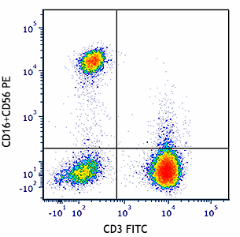
-

Human peripheral blood mononuclear cells were stained with anti-human CD3 FITC/(CD16+CD56) PE cocktail. Dot plot is gated on lymphocyte population.
| Cat # | Size | Price | Quantity Check Availability | Save | ||
|---|---|---|---|---|---|---|
| 319101 | 50 tests | 184€ | ||||
CD3: UCHT1 antibody reacts with a combinatorial epitope of CD3ε, a 20 kD chain of the CD3/T-cell receptor (TCR) complex found on all mature T lymphocytes, NK-T cells and some thymocytes.
CD16: 3G8 antibody reacts with CD16, a 50-65 kD transmembrane or a 48 kD GPI-anchored glycoprotein that is a member of the immunoglobulin superfamily. CD16 is expressed on NK cells, activated monocytes, macrophages, mast cells and neutrophils.
CD56: MEM-188 antibody reacts with the 175 - 185 kD isoform of CD56, N-CAM (Neural Cell Adhesion Molecule), which is expressed on NK cells and a subset of CD3+ T cells. CD56 is also expressed in brain (cerebellum and cortex) and at neuromuscular junctions. Certain large granular lymphocyte (LGL) leukemias, small-cell lung carcinomas, neuronal derived tumors, myelomas, and myeloid leukemias also express CD56.
Product Details
- Verified Reactivity
- Human
- Host Species
- Mouse
- Formulation
- Phosphate-buffered solution, pH 7.2, containing 0.09% sodium azide and 0.2% (w/v) BSA (origin USA).
- Preparation
- This reagent is a combination of FITC conjugated UCHT1 and PE conjugated 3G8 and MEM-188 in optimal concentration for two-color flow cytometric analysis.
- Concentration
- Lot-specific (to obtain lot-specific concentration and expiration, please enter the lot number in our Certificate of Analysis online tool.)
- Storage & Handling
- The antibody solution should be stored undiluted between 2°C and 8°C, and protected from prolonged exposure to light. Do not freeze.
- Application
-
FC - Quality tested
- Recommended Usage
-
Each lot of this antibody is quality control tested by immunofluorescent staining with flow cytometric analysis. For flow cytometric staining, the suggested use of this reagent is 20 µl per million cells or 20 µl per 100 µl of whole blood. It is recommended that the reagent be titrated for optimal performance for each application.
- Application Notes
-
Note:
Single color controls are required to perform instrument compensation and are not included in the kit. - Product Citations
-
- RRID
-
AB_314999 (BioLegend Cat. No. 319101)
Antigen Details
- Distribution
-
T-cell receptor (TCR) complex found on all mature T lymphocytes, NK-T cells and some thymocytes
- Cell Type
- Mesenchymal Stem Cells, NKT cells, T cells, Thymocytes
- Biology Area
- Costimulatory Molecules, Immunology, Innate Immunity, Stem Cells
- Molecular Family
- CD Molecules
- Antigen References
-
1. Barclay N, et al. 1993. The Leucocyte FactsBook. Academic Press. San Diego.
2. Beverly P, et al. 1981. Eur. J. Immunol. 11:329.
3. Lanier L, et al. 1986. J. Immunol. 137:2501-2507.
4. Fleit H, et al. 1982. P. Natl. Acad. Sci. USA 79:3275.
5. Stroncek D, et al. 1991. Blood 77:1572.
6. Wirthmueller U, et al. 1992. J. Exp. Med. 175:1381.
7. Lanier L, et al. 1991. J. Immunol. 146:4421.
8. Hemperly J, et al. 1990. J. Mol. Neurosci. 2:71.
9. Cremer H, et al. 1994. Nature 367:455. - Gene ID
- 920 View all products for this Gene ID
Related Pages & Pathways
Pages
Related FAQs
- What type of PE do you use in your conjugates?
- We use R-PE in our conjugates.
Other Formats
View All Reagents Request Custom Conjugation| Description | Clone | Applications |
|---|---|---|
| Anti-human CD3 FITC/(CD16+CD56) PE Cocktail | UCHT1; 3G8; MEM-188 | FC |
Customers Also Purchased
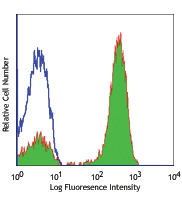
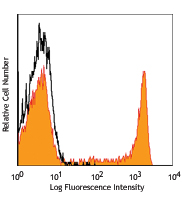
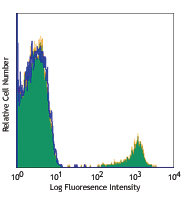
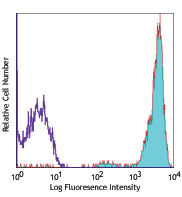
Compare Data Across All Formats
This data display is provided for general comparisons between formats.
Your actual data may vary due to variations in samples, target cells, instruments and their settings, staining conditions, and other factors.
If you need assistance with selecting the best format contact our expert technical support team.
-
Anti-human CD3 FITC/(CD16+CD56) PE Cocktail
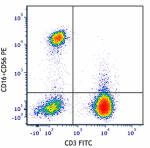
Human peripheral blood mononuclear cells were stained with a...
 Login / Register
Login / Register 













Follow Us